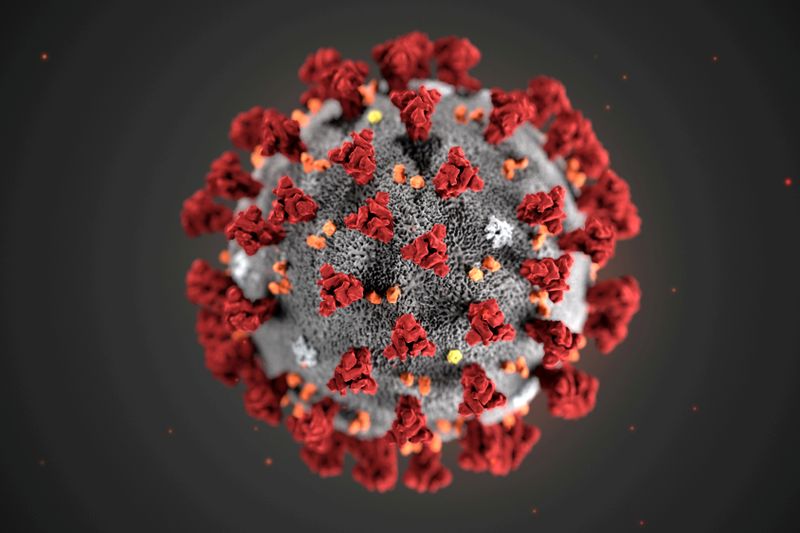By Nancy Lapid
(Reuters) - The following is a roundup of some of the latest scientific studies on the novel coronavirus and efforts to find treatments and vaccines for COVID-19, the illness caused by the virus.
Immune system T cell responses to variants remain potent
While worrisome coronavirus variants identified in Brazil, South Africa, and California have mutations that might help them resist antibody treatments and vaccines, the immune system's T cell responses to the variants are unaffected in recovered patients and in people who have received the Moderna (NASDAQ:MRNA) Inc or Pfizer (NYSE:PFE) Inc/BioMTech SE vaccines, new data show. "We think this is really good news," said Alessandro Sette of the La Jolla Institute for Immunology, whose team reported the findings on Monday on bioRxiv ahead of peer review. The T cells induced by vaccines can recognize pieces of the virus spike protein, while T cells induced by previous infection recognize multiple parts of the virus, including the spike and other proteins, Sette said. "These pieces are largely not changed/mutated in the variants," he explained. "This means that the T cell responses recognize the 'ancestral' sequence and the variants equally well." While circulating memory T cells would probably not prevent infection, they could reduce COVID-19 severity, he added. T cell responses are known to be linked with milder COVID-19, he noted, and may contribute to limiting COVID-19 severity induced by variants that partially or largely escape neutralizing antibodies. (https://
Asthma does not increase COVID-19 risks
Asthma itself is not a risk factor for hospitalization or more severe COVID-19, and people whose asthma is triggered by allergies may actually be at lower risk, according to new research presented at the American Academy of Allergy, Asthma and Immunology virtual annual meeting. Researchers at Stanford University studied 5,596 patients who tested positive for COVID-19 from March to September 2020. Of these, 11% were hospitalized, including 100 patients with asthma. After accounting for patients' other medical conditions that have been linked with more severe COVID-19 illness, including high blood pressure, heart disease, diabetes and obesity, "asthma was no longer a risk factor for hospitalization," said Dr. Lauren Eggert. Among patients who were hospitalized, asthma was not significantly associated with disease severity, she said. Researchers also found that patients with allergic asthma were nearly half as likely as patients with other types of asthma to need hospitalization. A possible explanation, Eggert said, is that in allergic asthma, the immune system "downregulates," or reduces the production, of the ACE2 proteins on cell surfaces that are a major port of entry for the coronavirus. (https://
Antibodies to variants may offer cross-protection
Antibodies to a newer, more infectious coronavirus variant might prevent infection by earlier variants, laboratory studies suggest. In test tube experiments, researchers studied the neutralizing effects of antibodies obtained from people infected with COVID-19 in the first wave of the pandemic in South Africa, when the initial version of the virus was predominant, and in survivors from the second wave, when a more infectious, harder-to-treat new variant predominated. First-wave antibodies neutralized the first-wave virus but not second-wave virus. As expected, second-wave antibodies neutralized second-wave viruses. They also neutralized the first-wave virus, although not as potently, according to a paper posted on Saturday on medRxiv ahead of peer review. In a news conference on Wednesday, co-author Alex Sigal from the Africa Health Research Institute said the findings offer hope that vaccines based on the variant could protect against this and other variants circulating worldwide. Pfizer, AstraZeneca (NASDAQ:AZN) Plc, Johnson & Johnson (NYSE:JNJ) and Moderna are already developing vaccines based on the variant identified in South Africa. Salim Abdool Karim, a top government adviser on COVID-19, predicted that by the end of 2021 most vaccine manufacturers will have adapted their shots, accordingly. (https:// https://reut.rs/2MHJaZ8)
UK finds vaccines protect elderly
The Pfizer and AstraZeneca vaccines are more than 80% effective at preventing COVID-19 hospitalizations in people over age 80 after one dose, Public Health England said on Monday, citing a study released on medRxiv ahead of peer review. The UK study also found that in people over age 70, two doses of the Pfizer vaccine are approximately 85% to 90% effective at preventing symptomatic disease. Pfizer vaccine recipients in that age group who did acquire symptomatic infections had a 44% lower risk of hospitalization and a 51% lower risk of death compared to unvaccinated patients. Because the two-dose AstraZeneca vaccine had only recently been introduced, researchers only had data after one dose. The effect against symptomatic disease was approximately 60% to 75%, and there was also a protective effect against hospitalization, the researchers said. They noted that the AstraZeneca data was gathered while a more-infectious variant was predominant in the UK. Britain's use of the AstraZeneca vaccine on elderly people contrasts with many European countries, which have cited a lack of clinical trial data for their decision not to use it on older people. (https:// https://reut.rs/3kKIEX4)

Open https://tmsnrt.rs/3c7R3Bl in an external browser for a Reuters graphic on vaccines in development.